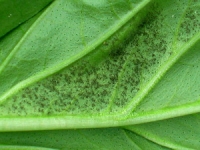It's a pandemic threatening to induce basil grinding and pesto-making from coast to coast--Downy Mildew--and it's right here in Louisville. As downy soft as it may sound, your sweet basil is at risk, because my dear sweet basil was already stricken with the blight.
It's not like I took it out to frolic with the neighborhood plants. We didn't bring in any strays. And, it had lived peacefully for weeks when it suddenly croaked on my windowsill. I chalked it up to my inability to grow most everything, and shook my head at myself for bothering.
That is, until I saw the photo of Basil Blight! Not only did I gain a little redemption as a gardening dabbler, but I learned I did nothing wrong to cause the sudden demise of my dear, sweet basil. Not only does the disease spread outdoors by wind carrying mildew spores, but seeds can also be contaminated.
If the tops of your basil leaves begin to yellow, turn them over and check for developing mildew spots. If your plant is stricken with the blight, it's time to use it, and fast! There is no treatment; not only is it on the plant, but it's inside the leaves. Basil Downy Mildew is a very new disease, with no cure, and no prevention, which makes growing basil not only difficult for the home gardener, but for farmers as well, especially organic farmers.
If you're able to find the problem just as it's beginning, go ahead and use the unaffected leaves of the plant, but if it's overcome with disease, bag it and trash it to avoid spreading Downy Mildew even further. Whatever you do, do not compost it.
Don't wait until September to pesto. Enjoy some fresh 4th of July pesto instead, perhaps with this fresh pesto recipe. We'll call it Freedom Pesto, and hope for healthier basil in 2011.
Photo: NPR.org, Dr. Margaret McGrath



